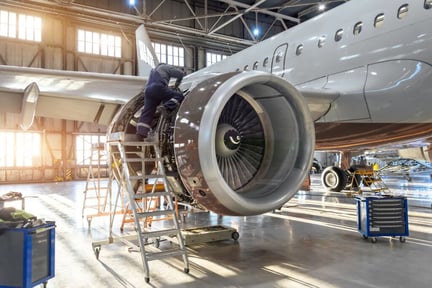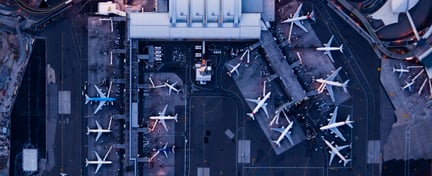Navigating the new era of risk
Businesses in the aerospace sector face complex and rapidly evolving risks. From geopolitical disruptions and shifting sovereign priorities to the impacts of natural disasters and soaring energy costs, the challenges are unprecedented. Key global trends such as supply chain integrity, cybersecurity, and Environmental, Social and Governance (ESG) concerns are reshaping how the aerospace industry operates, posing unique challenges in assuring assets and management systems, achieving product integrity, sourcing responsibly, navigating the energy transition and strengthening cybersecurity. We’re calling this the era of Assurance 4.0.
Market dynamics and challenges
As the industry grapples with stricter regulatory compliance, heightened safety and quality expectations, the push toward greener operations, rising production costs and the need for infrastructure upgrades, businesses in the aerospace sector face mounting pressure to address these challenges across their operations to remain compliant with global and local regulations, and maintain a competitive advantage. Here, we explore the key factors driving these challenges and the implications for aerospace organisations.
Regulatory compliance: The enforcement of stricter safety, environmental, and certification standards globally, by bodies such as the Federal Aviation Administration (FAA), Civil Aviation Authority (CAA), and European Union Aviation Safety Agency (EASA), is pushing companies to invest heavily in safety, quality, more sustainable materials and cleaner engine technologies. This investment is crucial to meet compliance requirements but, in the short term, has also increased production costs and operational re-alignment and complexity. Our recently published article, “How do aviation regulations impact AS 9100-certified organisations?” discusses the complexities and opportunities regarding regulatory compliance in the aerospace industry. Read more.
Safety and quality: Recent high-profile incidents in the aerospace industry have underscored the critical importance of safety and quality in every aspect of production, from advanced materials and assembly processes to the pressures of maintaining a zero-defect culture. Regulatory bodies have intensified their scrutiny, focusing on ensuring that the highest standards are met throughout the lifecycle of parts, processes, and sub-assemblies.
Greener aviation operations and net-zero goals: The aviation industry’s ambitious goal of achieving net-zero emissions by 2050 is driving significant technological advancements in airframe and engine technologies. Sustainable aviation fuels (SAF), new airframe structures and composite materials are all under increased safety and quality scrutiny. This is not just an internal, self-governance process but now involves greater oversight from third-party certification bodies and regulatory agencies, ensuring compliance and quality at every step.
Rising production costs and complexity: The costs associated with compliance, technological integration and the general increase in raw material prices are escalating. The industry’s ongoing digital transformation, often referred to as Industry 4.0, aims to streamline operations and offset these rising costs but implementing I4.0 can be expensive too. The cost of quality (COQ or COPQ) has become a core focus for executives, crucial for understanding the impact of quality issues on operating costs and margins.
Infrastructure and capacity upgrades: Modernising infrastructure, particularly in the airport sector, is vital for meeting net-zero goals. The commitment of major global airports to this goal necessitates extensive infrastructure improvements, especially in maintenance, repair, and operations (MRO) facilities. These improvements require rigorous quality assurance oversight and regulatory certification, further increasing the complexity and cost of operations.
Client perspectives: quality challenges and requirements
These broader challenges highlight that quality assurance is not just a compliance issue but a critical component of maintaining competitiveness and customer trust, however, as aerospace companies work to align their quality systems with business goals, they must also address the intricacies of process control, measurement and documentation, all while mitigating risks associated with non-conformances.
Based on AS 91XX audits conducted in recent years, several key quality challenges have emerged among clients, particularly in the aerospace, space and defence (ASD) industry, including:
- Control of production processes: Ensuring strict process controls, especially in special processes and production process verification, is critical. The recent release of the IA9145 standard highlights the importance of implementing advanced product quality planning (APQP) and production part approval process (PPAP) within the industry.
- Consistent KPIs: Clients often struggle with deploying measurable and strategic KPIs that align with business goals. Effective reporting and evidence of performance are crucial for demonstrating compliance and achieving quality objectives.
- QMS scope and business process definition: Defining and understanding the scope of the quality management system (QMS) and its processes is essential. This includes identifying inputs, outputs, and the interactions between processes, supported by tools like the Turtle diagram.
- Non-conformance management: Efficiently managing non-conformances and implementing effective corrective actions are ongoing challenges. Clients must ensure robust systems for tracking and resolving issues to prevent them from escalating.
- Release documentation: Accurate and traceable release documentation, including certificates of conformity, is essential for accountability and meeting customer requirements.
Quality management system issues
To summarise, these top five quality management system issues are the most common ones we've encountered as auditors over the past four years among tier 1, 2, and 3 suppliers in the ASD industry. The core of these issues lies in having a clear understanding of business goals, process capabilities, and role ownership and accountability throughout the organisation. These elements support a motivated and rewarding culture that aligns with safety, quality, on-time delivery, and ultimately, cost. When these priorities are set correctly, they serve the customer effectively and take care of the entire organisation, which in turn naturally benefits investors.
How LRQA can help
As we navigate this new era of risk, LRQA stands ready to support clients in achieving their quality assurance goals. Our expertise in auditing, certification, and training across various industries helps organisations enhance their quality management systems, ensure compliance with global standards, and mitigate risks. By focusing on integrated risk management and proactive quality assurance, we enable our clients to achieve safety, quality, and operational excellence, ultimately safeguarding their brand integrity and customer trust. While the challenges are significant, the opportunities for those who embrace this new era of quality assurance are even greater.





